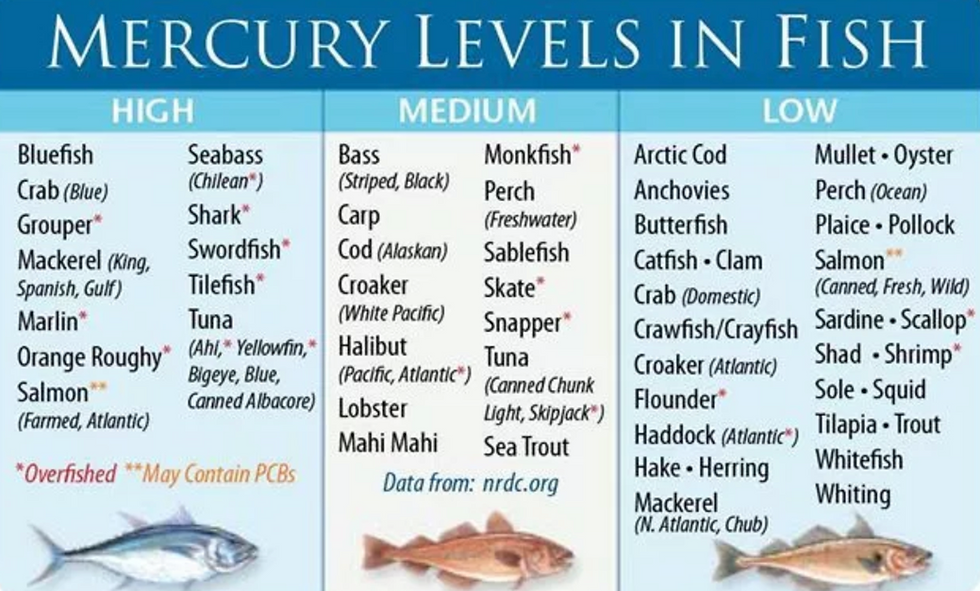Mercury and our Sea-life
- kautantowitmecautea
- Nov 23, 2020
- 3 min read
KM-HQ: 11/19/2020
Since time immortal fish and shellfish are a continued excellent food source of good quality protein. Fish and shellfish contain about 70 essential nutrients from the sea, are low in saturated fat, and contain omega-3 fatty acids. However, nearly all fish and shellfish contain traces of mercury. For most people, the risk from mercury by eating fish and shellfish is not a health concern.
We the people have been long programmed to accept the conclusion being that some fish and shellfish contain higher levels of mercury that may harm an unborn baby or young child’s developing nervous system. Here is a common char showing so as example:

They've always said that the risks really depend on the amounts of fish and shellfish eaten and the types of seafood – some seafood is going to be more toxic than others, and told pregnant women to avoid all seafood during pregnancy because of it, however, they've neer acknowledged that Mercury is in All sealife thanks to our species "evolutionary" Damage to the planet, Or that i included the depths of the oceans either.
A study has been published recently in the Proceedings of the National Academy of Sciences journal, provides evidence that the pollution from coal-fired power plants, mining, and other heavy industry is infiltrating and impacting the most remote ecosystems on the planet.
The study found methylmercury—the toxic form of mercury snailfish and crustaceans called amphipods at 33,630 feet down in the Mariana Trench in the northwest Pacific Ocean.
"Mercury that we believe had once been in the stratosphere is now in the deepest trench on Earth," said lead author and University of Michigan professor and environmental geochemist Joel Blum, in a statement. "It was widely thought that anthropogenic mercury was mainly restricted to the upper 1,000 meters of the oceans, but we found that while some of the mercury in these deep-sea trenches has a natural origin, it is likely that most of it comes from human activity."
Methylmercury, which is known to harm human and animal nervous systems, hearts, immune systems, and brains. The toxic moves up the food chain as smaller contaminated animals are eaten by larger ones, leaving humans who eat a lot of fish at risk of mercury pollution.
Of coarse the masses of proclaimed experts will say that five of the most commonly eaten fish that are low in mercury are shrimp, canned light tuna, salmon, pollock, and catfish, even since Fukishima, though they don’t supply as much omega-3s, they do contain some. We encourage our members and viewers to research and make educated choices for yourselves, after all, it's Your body that's going o be subjected to it!
The FDA and EPA say most women and young children should avoid the first four highest-mercury fish below. They’re considering adding the last two to the list. If you are a frequent consumer of any type of fish—24 ounces or more per week—Consumer Reports suggests that you avoid the fish below as well.
Swordfish
Shark
King mackerel
Gulf tilefish
Marlin
Orange roughy
For all you parents out there, you might wanna second think the common tuna sandwiches in your kids lunches as they say to minimize your mercury intake, limit your consumption of these higher-mercury fish:
Grouper
Chilean sea bass
Bluefish
Halibut
Sablefish (black cod)
Spanish mackerel (Gulf)
Fresh tuna (except skipjack)
We reference you a this time if you're interested in learning more about the test, to click on the link above for the direct report, or to click on this link to review our source sent for review and addressment: https://www.ehn.org/mercury-in-deep-ocean-2648891044.html
Also, just so you know, "Deep-sea trenches have been viewed as pristine ecosystems unsullied by human activities. But recent studies have found traces of anthropogenic lead, carbon-14 from nuclear weapons testing, and persistent organic pollutants such as PCBs in organisms living in even the deepest part of the ocean,"
Thank you for your interest, submissions and support. Stay tuned for future updates


Comments